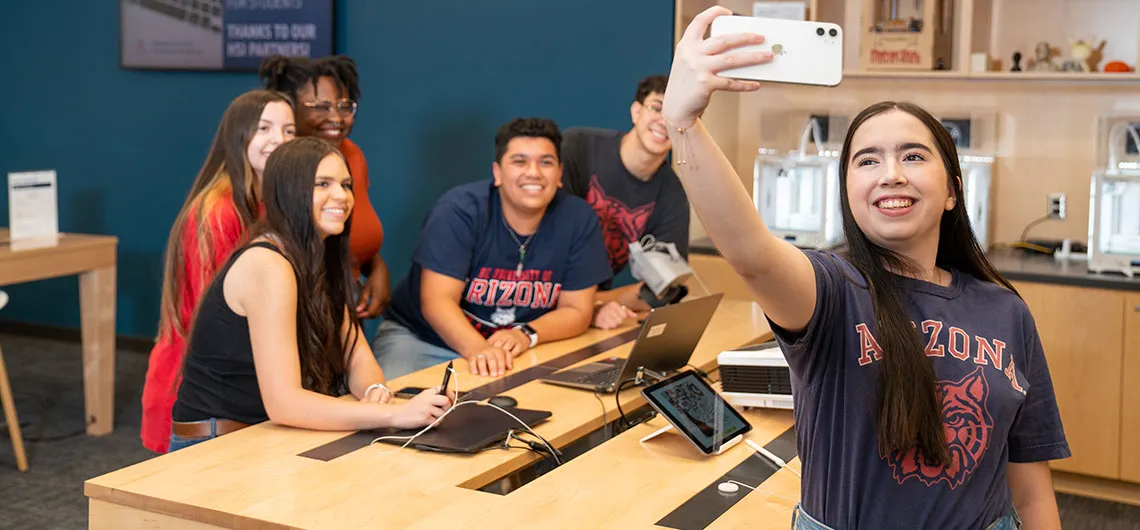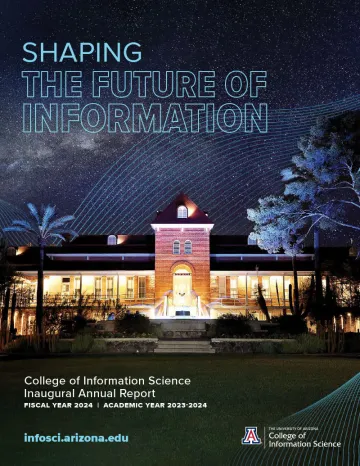Shaping the Future of Information: Announcing the Inaugural College of Information Science Annual Report

At the University of Arizona’s College of Information Science (InfoSci), the intersection of people, data and technology drives innovation and discovery. The college’s 2024 Annual Report—our first—captures a year of impactful research, student success and community engagement that showcases how the college is preparing students to meet society’s most pressing challenges.

In her welcome message, Interim Dean Catherine Brooks reflects on the college’s accomplishments under the annual report’s theme of Shaping the Future of Information. Noting that the college’s mission is to empower a diverse, equitable and inclusive future through information, Brooks writes, “Information is at the core of everything we do—from the way we tell stories and understand cultures, to how we harness the power of artificial intelligence and address the ethical questions that arise in an age of rapid technological advancement.”
A Year of Research, Resilience and Recognition
In 2024, InfoSci faculty and students tackled a wide range of critical issues—from AI’s impact on human collaboration to the use of virtual and extended reality in education and industry. The report highlights groundbreaking projects like the Next Generation Teams initiative, a U.S. Army-funded study examining how humans and AI can work together effectively in hybrid teams.
The college’s research impact extended far beyond campus, with faculty participating in national conversations on data ethics, AI regulation and climate resilience. Notably, InfoSci researchers were invited to present at the White House Tech Summit and received major federal grants, including $3.8 million from the NIH to study climate change and health impacts in arid regions.
Opportunity, Belonging and Growth at the Forefront
The college remains committed to cultivating a community of scholars and practitioners that reflects a broad range of perspectives and experiences, ensuring fair access to opportunities and resources. With 51% of students identifying as students of color and 43% coming from international backgrounds, the college continues to prioritize accessibility and representation in its programs, which in many cases are growing at impressive rates, with national rankings providing recognition while reinforcing the value of an InfoSci education in a rapidly evolving digital landscape.
The Knowledge River Scholars Program, which supports library and information professionals committed to serving traditionally underserved communities, remains a core part of this mission. The program has helped shape leaders in libraries, archives and community organizations across the U.S.
Looking Ahead: Shaping the Future Together
As Brooks says, alumni, industry partners and friends of the college play in helping the college to sustain and grow its impact: “Whether you are an alum, a friend or an industry partner, your support is critical to sustaining and expanding our impact. Through your generosity, we are able to offer scholarships, fund groundbreaking research and create a learning environment where creativity and critical thinking thrive.”
With a focus on interdisciplinary collaboration, the ethical use of technology and a community of innovators, the College of Information Science continues to push boundaries in research and education. InfoSci students, faculty and alumni are shaping the future of information, transforming society through bold ideas and compassionate leadership.
Read the full Annual Report to learn more about the College of Information Science and how we are advancing the dynamic fields of library and information science, game design and development, data science and more.

